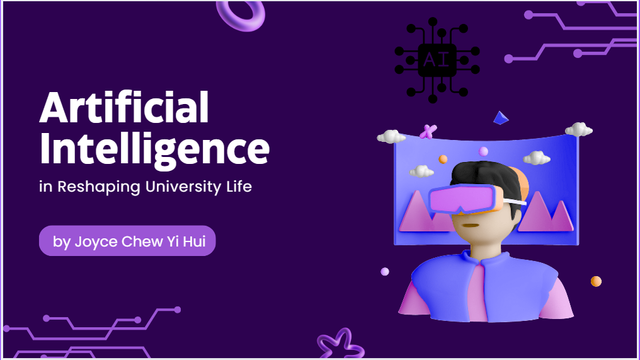Tentang KamiPedoman Media SiberKetentuan & Kebijakan PrivasiPanduan KomunitasPeringkat PenulisCara Menulis di kumparanInformasi Kerja SamaBantuanIklanKarir
2024 © PT Dynamo Media Network
Version 1.93.2
Konten dari Pengguna
The Impact of AI in Reshaping University Life
9 Desember 2024 11:13 WIB
·
waktu baca 5 menitTulisan dari Joyce Chew tidak mewakili pandangan dari redaksi kumparan

ADVERTISEMENT
Artificial Intelligence is changing the world, and this impact will be huge: in the way we work, live, collaborate, decide, and act as a society. AI is a big branch of computer science dealing with developing intelligent computers that can perform tasks that generally require human intelligence. AI is the world’s new trend as it has proved more efficient in many fields, mainly during the COVID-19 pandemic (Vaishya et al., 2020). AI helped fight the virus and globally rescued jobs and educational systems (UNESCO, 2020). Therefore, it is imperative to shed light on how AI is going to influence one of the most important aspects of life, which is higher education. This research article examines how AI influences higher education based on previous studies and on the experiences, views, and predictions of participants.
ADVERTISEMENT
AI and automation are transforming university life in terms of how students learn, participate, and are oriented toward professional life. AI has merged into our daily life from the aspect of virtual assistants that ease administrative burdens to AI-driven learning platforms, these technologies have provided us exceptional efficiency and convenience in our life.
"The question now is how can AI benefit individuals and Universities? What are the benefits of AI towards the educational field ? What are the risks of AI in education?"
AI in Enhancing Daily Life as a Veterinary Student at Universitas Airlangga
Artificial Intelligence (AI) is playing a transformative role in education and professional development, especially for veterinary students. As a first-semester veterinary student at Universitas Airlangga, the integration of AI tools has greatly improved my learning and practical experience. As a student I truly believe that AI can make a big difference in our study life with the correct ethical use and accurate information findings. AI can ease our research work and also widen our knowledge beyond our studies in schools by providing us with up-to-date news, articles, reports, data and statistics. Here are some of the key aspects of how AI is important towards the educational field.
ADVERTISEMENT
1. Streamlining Learning with AI Tools
AI-driven platforms have allowed students to personalize their learning experiences such as adaptive learning technologies. For example with the help of Google Scholar and AI-organizers of note-taking, students are able to collect, summarize, and even better understand vast amounts of veterinary information in a very short time. In addition, tools like Quizlet and Anki—using AI algorithms—update flashcards based on individual student learning pace and retention abilities, improving the effectiveness of studying. At the administrative level, it brings advantages to institutions through the improvement of management operations. It replaces some help in appointment settings, reminding, or even answering frequently asked questions from students on campus activities—especially virtual assistants like Siri or Alexa. In other terms, universities' official chatbots help new students browse registration procedures, examinations, or tuition payments, lessening a workload for administrators and saving much time.
ADVERTISEMENT
2. Virtual Dissection and Animal Models
AI-enabled virtual dissecting tools bring a new dimension to learning about animal anatomy and physiology in an interactive manner. This technology reduces the need for the dissection of live animals in early learning, observing ethical practices and giving students repeatable risk-free learning experiences.
3. Case Studies and Diagnostics
AI applications simulate veterinary diagnostic scenarios. The use of AI in virtual cases walks the student through making a diagnosis of disease, interpretation of laboratory results, or understanding surgical procedures. This allows for hands-on learning without having actual live patients in the first years of your education.
4. Communication and Multitasking
AI tools have enhanced communication in terms of supporting multilingual environments for foreigners. For instance, I am an international student studying abroad at Universitas Airlangga in Indonesia. Language problems have always been a problem when it comes to communicating with locals, professors, or even when asking for help on the school grounds. Translation apps and grammar assistants will help make student's reports professional, presentations, and collaborative work accurate. Not to mention, AI collaboratively enhances platforms like Microsoft Teams and Zoom through AI-driven features that allow noise suppression in real time, video enhancements, and therefore assure seamless virtual collaboration—especially needed during the COVID-19 pandemic when hybrid learning became a default.
ADVERTISEMENT
AI tools also lighten administrative burdens, freeing the educator for more teaching. Predictive analytics in education can help to pinpoint at-risk students by applying timely interventions so as to improve retention and success rates.
Challenges and Ethical Considerations
Although AI has many of its benefits, thus it also has its own set of challenges and risks. While AI is an asset, over-reliance on it undermines critical thinking which is a crucial aspect for us as students. Balancing the use of technology while manually learning ethical decision-making is a very important thing to keep in mind. Moreover, since veterinarians deal with sentient beings, the empathy and observational skills derived from hands-on practice are still irreplaceable by AI for now. The universities need to emphasize ethical AI use and ensure that automation complements, rather than replaces, human expertise.
ADVERTISEMENT
Conclusion
AI and automation are going to change university life and make higher education more accessible, effective, and innovative. The balancing act that universities have to manage in integrating the technologies in view of ethics is thus very central, since students will need preparation for a future that belongs to AI. That would be a very smart use if it makes universities truly inclusive, advanced-learning institutions.
References
ADVERTISEMENT

